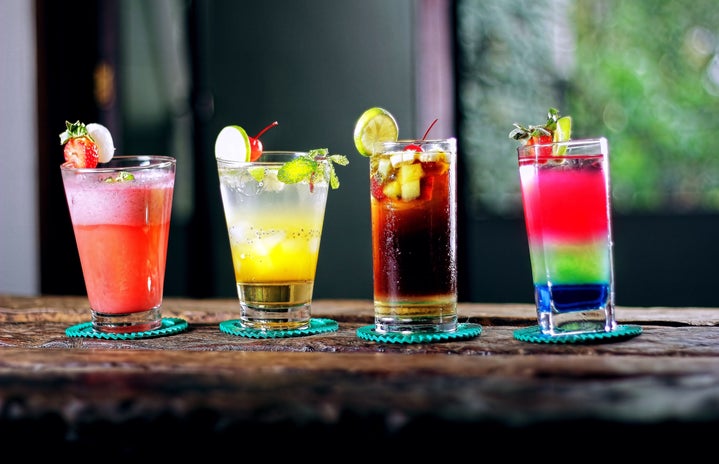It is no secret that alcohol plays a large role in everyday life; dependence on it roots itself into nearly every aspect of society. By analyzing and discussing an article written by Kristi Coulter, it is even easier to see the significance of alcohol and the effects it has, especially on women.
In her article, “Giving Up Alcohol Opened My Eyes to the Infuriating Truth About Why Women Drink,” Coulter analyzes the presence of alcohol in daily life and the nuances of its consumption that dominate everything – from yoga and cooking classes to workplaces – and the idea that this has impeded the success of women for generations.
I wholeheartedly agree with Coulter, especially because I have experienced these alcoholic undertones throughout my life and especially now. I recently moved into an apartment right next to my university, and finally living the “college life” puts me in close contact with substances like alcohol that Coulter’s article discusses. Much like the modern lives of women, college is inundated with alcoholic nuances and the general idea that life can only be fun when you’re under the influence. This is especially relevant in a time like now, with a pandemic running rampant and stress levels through the roof. At the bottom of it, we really can’t blame a single person for these problems, but a corrupt, centuries-old system. This system has taught us that, as students, we simply need to avoid substances at all costs and simply accept sadness and anxiety rather than provide us with solutions to the very problems that make us feel this way.
Coulter’s article allowed me to critically reflect on my experiences within the past three months since I moved here. Since I had surgery just three days before my move and couldn’t partake in certain college experiences, I really allowed myself to sit back and watch the lives of my friends who depend on substances in order to be happy or “have a good time.” I remember that many of my peers in high school had the same mentality, and honestly, the only person who encouraged me to see partying in a different light, rather than condone constant substance consumption – the same way this article did – was my best friend who had family experiences with alcoholism. It’s really frustrating that, sometimes, the only people who aren’t heavy drinkers or drug users are the ones who were traumatized by it.

Another reason for this chronic dependence on substances is that our parents drink so much. At SCU specifically, the suburban, predominantly white, high-middle class houses that we live in are decorated with quote signs demonstrating the need for alcohol in order to deal with annoying children and pets and lives and patronizing husbands. Much like Coulter’s article explained, the fun of life has been so drained that alcohol is a necessity in order for people to be satisfied. Is it so difficult to have dinner and talk with your friends without three glasses of wine to go with it, leaving you wine drunk at the end of the night and just a little bit happier? Especially in college, students feel such a need to drink and do drugs because they think that since everyone else is doing it, if they stay sober, they become the odd one out. One friend of mine who doesn’t drink is often looked at strangely at parties’ fraternity boys become frustrated when they can’t mess around with her. Like Coulter says: “There’s always one person who can’t deal if someone isn’t drinking.” People who choose not to drink are constantly bombarded with questions and made to justify their choice rather than the simple “I don’t want to” being accepted. People are so accustomed to substance use that they think there must be some crazy reason for not wanting to drink. I wish that people could be happy without the risk of hurting themselves.
In the end, drinking or doing drugs doesn’t make you a bad or irresponsible person, even if you misuse them; the constant presence of these substances in our lives – and the use of them by the adults we look up to – makes the use of such substances just that much more inevitable. That being said, enjoying nights of drinking or substance use are not something to be criticized; rather, it is necessary to be aware of the effects of overuse, recognizing when it’s used for escape rather than enjoyment.



